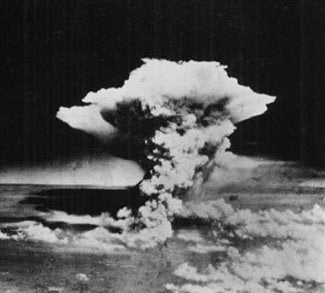“The World Has Reached A Dangerous Point”: Rising Threat Of Nuclear War. Gorbachev

As Russia and America creep ever closer to outright conflict, now that the diplomatic facade of the proxy war in Syria falls away with every passing day, one voice if calling for the world to stop and reassess what it is doing. Former USSR leader Mikhail Gorbachev warned on Monday that the world has reached a “dangerous point” as tensions between Russia and the United States surge over the Syria conflict; a conflict which if escalated even fractionally further, could result in all out war between the two superpowers according to General Joseph Dunford.
Gorbachev blamed the current state of affairs between Russia and US on the “collapse of mutual trust” and urged the sides to resume dialogue and push towards demilitarization and complete nuclear disarmament.
“I think the world has reached a dangerous point. I don’t want to give any concrete prescriptions but I do want to say that this needs to stop. We need to renew dialogue. Stopping it was the biggest mistake. Now we must return to the main priorities, such as nuclear disarmament, fighting terrorism and prevention of global environmental disasters. Compared to these challenges, all the rest slips into the background.” Gorbachev said in an interview with RIA Novosti.
Relations between Moscow and Washington, already at their lowest since the Cold War over the Ukraine conflict, deteriorated sharply in recent days as the United States pulled the plug on Syria talks and accused Russia of hacking attacks.

Soviet President Mikhail Gorbachev (L) and U.S. President Ronald Reagan begin their mini-summit talks in Reykjavik October 11, 1986.
As a result, last week Russia moved nuclear-capable Iskander missiles in Kaliningrad, near the hear of central Europe, an indication that a nuclear disarmament is the last thing on the mind of either Putin or Obama; quite the contrary a new nuclear arms race has begun. That, however, did not stop Gorbachev to preach the need for nuclear disarmament.
“Of course, at this moment it is difficult to talk about moving towards a nuclear-free world, we must honestly admit it. But we should not forget: as long as there are nuclear weapons there is the threat of their use. It could be an accident, a technical malfunction of someone’s evil will – a madman or a terrorist,” the former Soviet leader said. Or a perfectly sane, administration official intent on starting a new world war to benefit his or her financial backers.
In the interview, Gorbachev also reminded that in line with the nuclear non-proliferation agreement all of its signatories must hold talks on nuclear disarmament uniting the eventual full destruction of nuclear weapons.
“The nuclear-free world is not a utopia, but rather an imperative necessity. But we can achieve it only through demilitarization of politics and international relations.”
Gorbachev added that veterans of international politics, such as the “council of sages” chaired by former UN leader Kofi Annan, understood these problems and expressed hope that their voices would be heard by modern leaders. At the same time he emphasized that the main responsibility for global security lies on these modern leaders who would make the greatest mistake if they do not use the last chance to return international politics to a peaceful course.
The former Soviet leader’s interview was published on Monday to coincide with the 30th anniversary of the USSR-US summit in Reykjavik, which eventually allowed the nuclear arms race to slow down and greatly contributed to the end of the Cold War. Ironically, it comes out at a time when the nuclear arms race is back front and center.
Looking back to a more sensible time, Gorbachev reiterated that the Reykjavik summit was a major breakthrough. “First, we agreed on many issues and second, we managed to look over the horizon, see the perspective of a nuclear-free world,” he said.
“It was very appealing that in the course of our negotiations President Ronald Reagan sincerely spoke about the necessity to rid the world of the weapons of mass destruction. We shared a common position on this issue.”
Sadly, today that is no longer the case, and as we said over the weekend when we profiled the latest Russian nuclear escalation, the next move will be one by NATO and it will be proportional, as the west delivers even more nuclear weapons in close proximity to Russia in what will become a tit-for-tat “defection” from the game theoretical equilibrium, until the “accident, technical malfunction, madman or terrorist” emerges and unleashes an unthinkable scenario.

